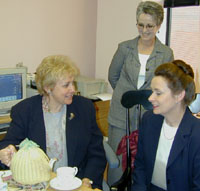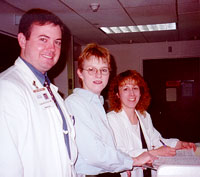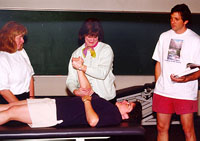Foundation to award faculty for excellence in teaching
Three faculty members will receive the 2000 Health Sciences Foundation Teaching Excellence Awards during the Fall Faculty Convocation in August.Announcement of the award recipients from among 36 candidates in three award categories comes now for the benefit of the faculty and graduating students.
Chosen from the nominees, this year’s recipients are Maralynne D. Mitcham, Ph.D.; Kristi Lenz, Pharm.D.; and Robbie Leonard, M.S., P.T.
The recipients will be honored at the Faculty Fall Convocation in August.
During that ceremony they each will receive a check for $3,000, a $1,000 professional development award, a commemorative plaque, and a special medallion to wear with their academic regalia at the 2001 Commencement.
For more on the 2000 Health Sciences Foundation Teaching Excellence Awards, turn to page 6.
Maralynne D. Mitcham, Ph.D., OTR/L, FAOTA, will receive the Educator-Mentor award for excellence in mentoring and role modeling.
 Dr.
Maralynne Mitcham, left, shares tea with current student Becky Roberts,
standing (also program manager for the MUSC IRB), and former student Dr.
L. Julia Ball, right. Roberts and Ball nominated Mitcham for the award.
Dr.
Maralynne Mitcham, left, shares tea with current student Becky Roberts,
standing (also program manager for the MUSC IRB), and former student Dr.
L. Julia Ball, right. Roberts and Ball nominated Mitcham for the award.
A professor in the Department of Rehabilitation Sciences, College of Health Professions (CHP), Mitcham joined the MUSC faculty in 1984. She also holds an appointment in the MUSC College of Graduate Studies.
Mitcham was nominated by CHP graduate student Becky Roberts, manager of the IRB, for whom Mitcham has served as mentor, advisor and teacher. In her letter of support, Roberts wrote, “No professor has influenced me so positively as Dr. Mitcham. This influence has had a profound effect on my performance in the Health Professions Education program.”
Mitcham has been a visiting professor of Occupational Therapy in Australia, Canada, New Zealand and South Africa during the past 10 years.
Gail Whireford, Ph.D., Charles Sturt University, Australia, wrote, “I have...Maralynne to thank for my career successes. She inspired and encouraged me through all phases of my doctoral research and has been both mentor and advocate when it really counted.”
Mitcham’s teaching responsibilities at MUSC are directed at post professional graduate programs in the Department of Rehabilitation Sciences. Her students are credentialed health professionals seeking advanced graduate study. Classes and activities are held in the evenings, on weekends, and in intensive blocks of time to suit students’ full-time work schedules. More than 60 percent of Mitcham’s teaching time is spent mentoring.
Three students who graduated after having Mitcham as a mentor wrote letters of support for this Teaching Excellence Award. Beth Stone, R.N., BSN, MS/HPE, coordinator at Roper Hospital School of Practical Nursing, commented, “Her high ethical principles and moral values shine brightly as she demonstrates sensitivity for all whose lives she touches.”
Ann-Ray Crocker, MHS, OTR/L, another MUSC graduate, wrote, “It seems everything she does serves to benefit others—students, members of the community, other professionals. She is such a giving and unselfish person who never asks for or expects anything in return, which makes her the epitome of all that a mentor should be.”
Mitcham continues as mentor sometimes after her students graduate. Ron Carson, MHS, OTR/L Quality Life Designs, describes his relationship with her. “She fostered professional and personal growth and development, utilizing strategies and techniques that come from years of both clinical and academic experience. Her knowledge, wit and gentle yet firm manner provided the fulcrum necessary to develop skills needed in the professional arena.”
Becki Trickey, Ph.D., OTR/L, interim chair in Mitcham’s department, lauded Mitcham’s teaching and mentoring skills. Trickey noted, “Her flexible and creative approach to the teaching-learning process is that of mentoring both for students and faculty. As a mentor, she encourages the learner to strive for excellence in their chosen professional path—and—to contribute to the body of knowledge rather than just learning it. Thus, we all benefit from the excellence in mentoring that Dr. Maralynne Mitcham provides.”
Mitcham’s essay on mentoring sums up her philosophy. “As a role model, I behave collegially, with a leader-as-learner attitude, and I confess to a pioneer spirit in creating new opportunities for learning. As I reinforce the elements of awareness, honesty, and responsibility, I leave a trail not only for the next generation of mentees but also for the next generation of mentors.”
Kristi Lenz, Pharm.D., assistant professor and clinical oncology specialist in the College of Pharmacy, will receive this year’s Educator-Lecturer award for excellence in classroom teaching.
Lenz has received the Professor of the Year award from pharmacy students for four of the five years she has taught at MUSC. She has also received three Applause Awards.
 Kristi
Lenz, Pharm.D., center, reviews a patient’s medication chart with fourth-year
Pharmacy student, Jill Vukovich, and first-year medical resident, Dr. Craig
McCutter.
Kristi
Lenz, Pharm.D., center, reviews a patient’s medication chart with fourth-year
Pharmacy student, Jill Vukovich, and first-year medical resident, Dr. Craig
McCutter.
Lenz was nominated by Jennifer Sandys, Chandace Benton, Erika Smith, and Terri Howard, all third-year Pharm.D. students. Sandys describes Lenz as “an outstanding instructor—just as excited to be [in the classroom] the first hour as she is the third hour. Her energetic teaching style is motivating to the students in her class. She loves her job and cares about the students, and it is evident the minute she enters the classroom.”
Her chair, C. Wayne Weart, Pharm.D., noted that “Dr. Lenz coordinates and teaches one of the disease processes and therapeutics sections in the area of oncology. This topic area is typically one of the more challenging areas of therapeutics, and she has consistently received rave reviews from students for making the content understandable, clinically relevant and practical.” Her involvement in the course for the past two years has included significantly altering the course content to give students more time for case discussions and practice in medication counseling. Course evaluations note the effectiveness of using the cases and group discussions.
Lenz developed, coordinated and co-taught a new elective course, “Survey of Herbal Medicine and Healing Practices.” Her description of her role in the course also noted that she served as faculty evaluator for student presentations on alternative healing practices. Weart anticipates that this course will become part of the required curriculum in the near future.
Students consistently give Lenz high marks in their evaluations. Sample comments included: “This course was one of the best structured classes we have had;” “I really enjoyed the fact that we had lots of cases to practice on. Overall good module—best one and best organized one so far;” “Dr. Lenz is a very effective teacher with an enthusiastic attitude;” and “She’s always available and more than happy to help.”
Locally, nurses and pharmacists at Hollings Cancer Center and University Hospital have participated in a number of Lenz’s in-service programs on chemotherapy. Regionally, Lenz has provided lectures for practicing pharmacists and nurses in the Coastal AHEC Region and elsewhere in North and South Carolina.
Lenz’s philosophy of teaching focuses on four qualities: enthusiasm, love of subject material, fairness, and empowering students to think. “The first two go hand-in-hand,” she says. “If you love what you teach, you cannot help but be enthusiastic.”
She notes that “Fairness is trickier.” Exams should reflect emphasized material, and if all students learn that material well, then all should receive high marks. However, exams should be sufficiently challenging to empower students to think. This is the fourth, and in my opinion, most important quality.”
Robbie B. Leonard, M.S., assistant professor of rehabilitation sciences, is the recipient of the 2000 Developing Teacher award for teaching excellence by a junior faculty member with fewer than four years of teaching experience.
Leonard teaches 72 (3 classes of 24) students in Greenville in traditional classrooms and labs, and she teaches those students and an additional 100 students in Charleston via Distance Education. The first Greenville class will graduate in May.
 Robbie
Leonard, M.S., P.T., center, is shown in a physical therapy practice laboratory
with students Karen Hartney, left, Beth Ryland, on table, and Todd Stock.
They are part of the MUSC Physical Therapy Educational Program in Greenville.
Robbie
Leonard, M.S., P.T., center, is shown in a physical therapy practice laboratory
with students Karen Hartney, left, Beth Ryland, on table, and Todd Stock.
They are part of the MUSC Physical Therapy Educational Program in Greenville.
Leonard was nominated by both her supervisor, James R. Morrow, Ed.D., interim director of the Physical Therapy Program, and a student, Lisa Bettio.
Bettio, a second year PT student in Charleston, wrote in her nomination letter, “Leonard is a remarkable teacher, colleague, advisor, and friend. She has made an incredible impact on my professional development even though she is located on the Greenville campus.”
“She has a unique way of incorporating a variety of learning styles in her lectures which is absolutely necessary when teaching in an interdisciplinary program through distance education. For example, she incorporated the use of visual aids, charts and diagrams, videos, notes, colors, and demonstrations that appeal to all her students (i.e., physical therapy, occupational therapy, and communication science and disorders).”
The many letters of support from students in both Greenville and Charleston commented on Leonard’s approachability regarding personal as well as academic questions. She impressed these students with her dedication (evidenced by her working long hours to prepare for class), her ability to use examples from her years of clinical experience, and her open door policy.
Students also commented that her exams are “wonderful despite their difficulty because I walk out knowing more than I did when I entered, thanks to her knowledge and feedback.” Charleston students noted that she learns their names and has come to visit them in person. She uses student evaluations to accommodate her teaching to the needs of her students.
Students and colleagues also admired Leonard’s involvement with the South Carolina Chapter of the American Physical Therapy Association. She not only serves on association committees, but also presents the most current clinical and administrative information to practicing physical therapists and physical therapy assistants.
All the support letters commented on Leonard’s success in using distance education technology. Indeed, she has become an “in-house expert” in that technology. As Morrow stated, “As a result of her level of understanding of the unique characteristics and limitations of distance technology, she has developed and demonstrated the ability to interact with and engage students at a distance as effectively as she does with on-site students, and she is constantly sought out by other faculty who want her assistance in developing these skills.”
Leonard embodies her philosophy of teaching, part of which is that “health
care educators must help students develop the tools necessary to succeed
in a rapidly changing healthcare environment. To reach this goal,
I believe successful teachers must foster a collaborative learning environment,
use a variety of teaching strategies, demonstrate passion for their work
and serve as professional role models.”